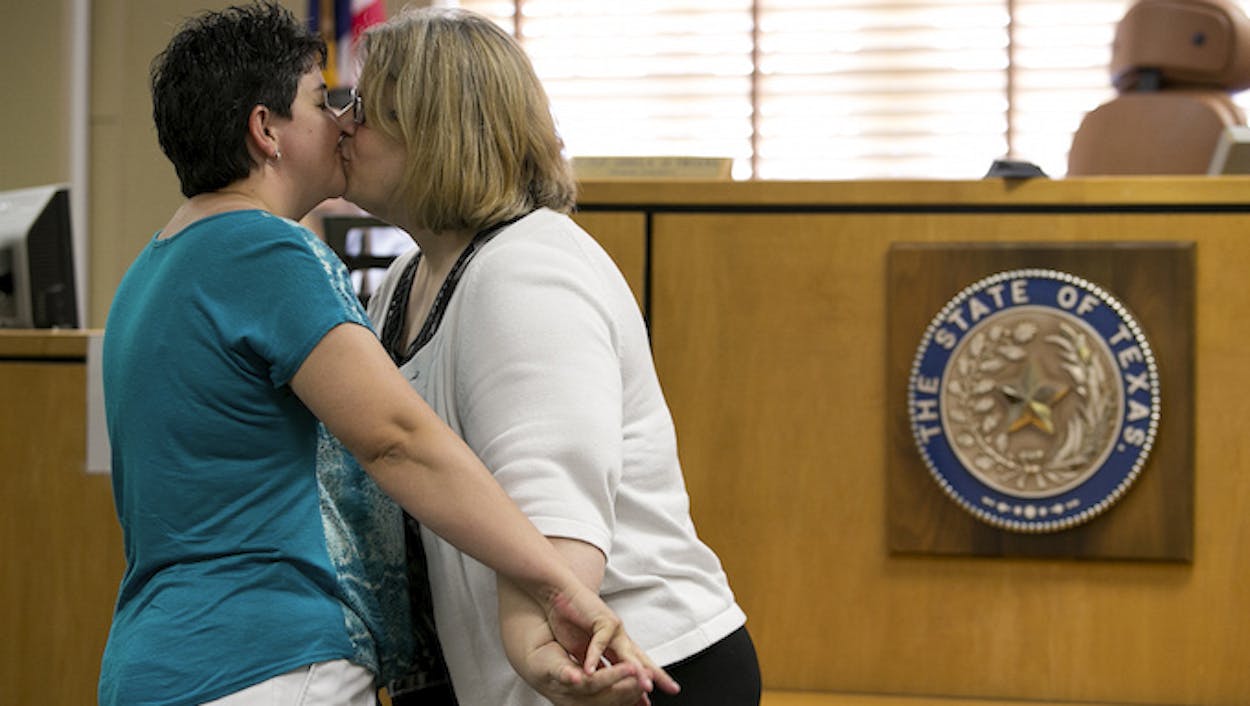When the Supreme Court ruled that states could not restrict the right to marry exclusively to straight couples in late June, Texas Attorney General Ken Paxton urged county clerks who objected to gay marriage to refuse to provide marriage licenses. Paxton assured the clerks that a lawyer somewhere would be willing to defend them against the eventual lawsuit, maybe even for free. And though clerks in Hood, Dallam, Roberts, Irion, Hartley, Loving, and Hamilton counties followed that advice — leading to one lawsuit against Hood County, so far — a Rusk county clerk opted to follow her religious beliefs in a different manner: She resigned. As the Kilgore News-Herald reported last week:
Eleven days after the Supreme Court’s June 26 decision to legalize gay marriage in all 50 states, Rusk County Clerk Joyce Lewis-Kugle made the decision to retire from her post after a decade of service; the county’s commissioners accepted her resignation Monday.
Lewis-Kugle did not attend this week’s regularly-scheduled meeting.
“I am grateful to have had the opportunity to serve the citizens of Rusk County over the last ten years as their County Clerk,” she wrote in her letter to Rusk County Judge Joel Hale, dated July 9. “Before taking office, I was required to take an oath to uphold the laws of this State and the United States. Due to the recent decision by the Supreme Court, the laws I swore to have now changed.”
Hale and Lewis-Kugle called the move a retirement; the clerk’s decision was labeled as a resignation on the Rusk County Commissioners Court agenda for July 13. The five-member court accepted the resignation unanimously during the meeting in Henderson Monday morning.
There’s been a lot of talk about how county clerks who object to this interpretation of the Fourteenth Amendment should proceed with job duties. Paxton’s advice was curious, and it left county clerks in other parts of the state confused, too. That’s something that the Fort Worth Star-Telegram’s Bud Kennedy discovered in the wake of the ruling and Paxton’s letter to the clerks. As Kennedy reported:
After Attorney General Ken Paxton — the state’s civil lawyer, not a primary legal authority on county matters — advised clerks to defend religious freedom but expect lawsuits, Ellis County Clerk Cindy Polley wrote: “Does it seem to anyone else the AG is putting it back on us?”
“HELP!” Brewster County Clerk Berta Rios Martinez wrote. “I just had my first gay couple come in for a marriage license and I ran them off!! … Did I do right? HELP!!!”
Shelby County Clerk Jennifer Fountain wrote her “vent” after a resident told her that issuing the licenses was “taking Shelby County to the fires of hell”:
“Why didn’t [Abbott] say ‘The state of Texas WILL NOT ISSUE same sex marriage licenses. If you want to sue, sue the State.’ Instead, he hung us all out to dry, threw us under the bus.”
Paxton essentially told clerks to follow their religious beliefs, despite the fact that doing so in their position as employees of the state is unconstitutional. His assertion that those clerks could get sued seemingly recognized the conflict in his advice. And though attempts to follow up with Lewis-Kugle have been unsuccessful, it’s fair to say that her approach to the situation is a valid one. County clerks who don’t want to issue marriage licenses to gay couples absolutely possess the religious freedom to refuse to do so. They just can’t be county clerks anymore.
To that end, even if you support gay marriage rights, Lewis-Kugle’s courage of conviction should be recognized. America is founded on disagreement, and it doesn’t always work out so great for countries where everybody is on the same page all the time in any case.
And if we’re going to talk about what a “sincerely held religious belief” is — as Paxton described it — we have an example in Lewis-Kugle’s case. If it’s a belief that you’re willing to sacrifice your job over, people can argue about whether or not you’re right or wrong for holding it, but nobody can question your sincerity. And at a time when officials are trying to have it multiple ways at once, it’s refreshing to have an example of how a sincerely held religious belief is really followed — by doing so with consequences.
(Deborah Cannon/Austin American-Statesman via AP)








